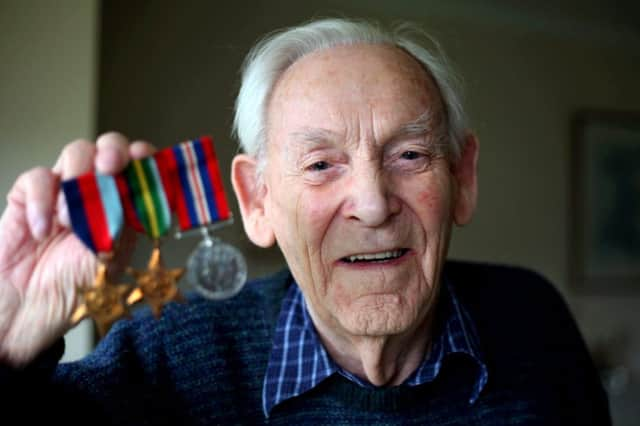Obituary: Major Gordon Smith, former PoW


MAJOR Gordon Smith was a prisoner of war on the notorious Burma-Siam Railway and his war service interrupted his medical studies at Edinburgh University. His medical knowledge, however, proved vital during his captivity as he administered medical care to his gravely ill and undernourished comrades in the Argyll and Sutherland Highlanders.
He saved countless lives despite being shot, captured and forced to work on starvation rations while suffering from malaria.
Advertisement
Hide AdAdvertisement
Hide AdSmith, a brave and resolute man of much charm and energy, was captured by the Japanese when aged just 21. During captivity he had to carry out amputations using makeshift and primitive instruments to save stricken comrades afflicted with gangrene from infected sores. The conditions were no less precarious: he operated on an ironing board and even manufactured his own surgical implements.
His own health deteriorated and he had been condemned to death when the Americans dropped the first of two atomic bombs on mainland Japan, bringing the war to an end.
Smith’s experience as a PoW on the Death Railway – the basis of the famous film, Bridge on the River Kwai – was extreme and his bravery to see it through displayed immense courage.
When he was finally liberated he weighed six stone. In 2008 Smith published his memoirs (War Memories: A Medical Student in Malaya and Thailand) in which he modestly commented, “It was a disturbing experience for one so young and there’s a lot of things that I know because of my war experience. Because I am the last surviving officer that served in Burma I feel it is a story that needs to be told.”
Joseph Gordon Smith was born in Edinburgh and attended Melville College before going up to Edinburgh University to read medicine. In 1939, after two years, he left to enlist. He first spent three years as an air raid warden and an ambulance driver before training as an officer at Sandhurst.
In 1941 Smith was commissioned into the 2nd Battalion the Argyll and Sutherland Highlanders and posted to the jungles of Malaya: the regiment was to become “one of the best jungle fighting units in the British Army”. Smith was in Malaya when, that December, the Japanese invaded from Thailand and within weeks Smith served at the Battle of Slim River.
The Argylls took up a defensive position but without anti-tank weapons. The Japanese advanced rapidly and their tanks drove straight through the Argylls, who fought ferociously and delayed their progress.
During the chaos of battle Smith went forward to reconnoitre enemy positions. He was promptly shot by a sniper and collapsed into a ditch with three serious wounds to an arm. He ran into the jungle and met up with colleagues from his battalion but his arm was paralysed and his makeshift clay bandages proved less than successful.
Advertisement
Hide AdAdvertisement
Hide AdOne morning when trying to get back to the British lines he woke to find a 20ft boa constrictor had wormed itself round one of his legs for warmth. Smith carefully disentangled the reptile which slid off into the jungle. Smith was then captured and sent to the Pudu prison.
The conditions were hellish but Smith brought all his medical (and engineering) skills to maximum use. He even mended the radio – hidden in a false lid of the stool used by the Japanese commandant during searches.
Worse was to follow. Smith was transported in a jam-packed boxcar to build a camp and then work on the infamous Burma-Siam Railway. At first he worked building the bridges but a hospital was constructed and Smith was transferred there and worked as the anaesthetist.
His ingenuity in inventing and transforming the most everyday item proved invaluable. A mask he made could sedate patients with chloroform undergoing the most hazardous operations. Smith created a distillation unit which saved many lives and he also perfected a way of providing an early diagnosis of malaria, which afflicted many of the prisoners.
In 1945 Smith, who was awarded the 1939-45 Star, the Pacific Star and the War Medal, was flown to Rangoon and back to Southampton where he married (wearing full Highland regalia) his childhood sweetheart, Sheela Gleeson.
He was then transferred to the Royal Army Ordnance Corps and spent many years in Germany on bomb disposal operations. In 1959, he moved to De Havilland to work on the Blue Streak rocket and, ten years later, served as safety officer in French Guyana for the Europa rocket project. In retirement, he firstly lived in the south of France then in Edinburgh before moving to Peebles some years ago.
Sheela died in the 1960s and Smith married in 1983 Marguerite Delavenay, now 82. She and two sons and a daughter from his first marriage, survive him.